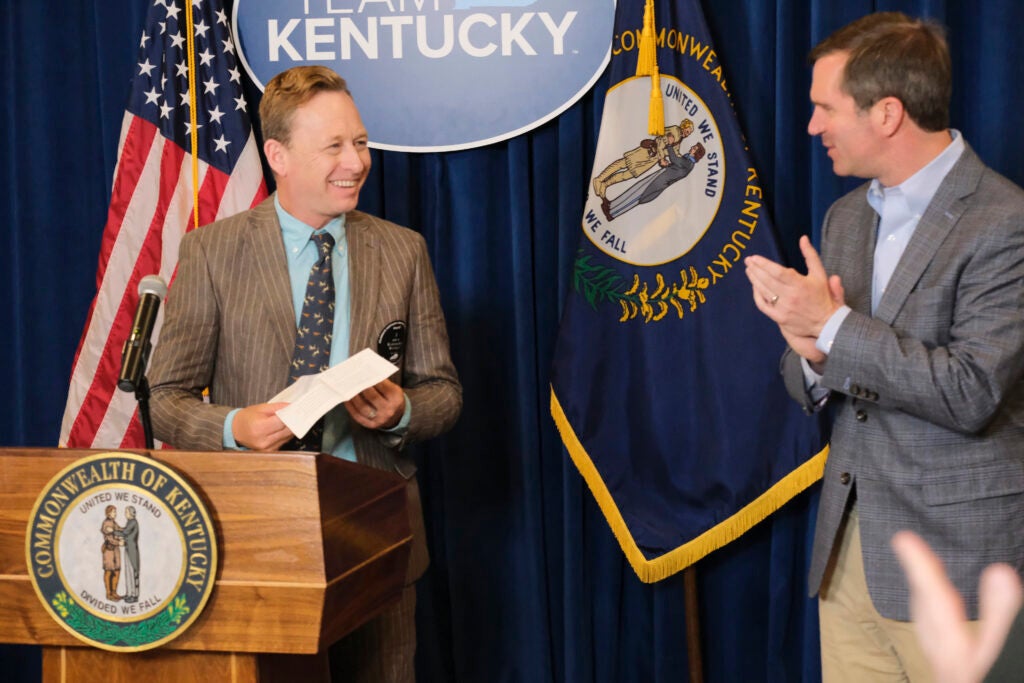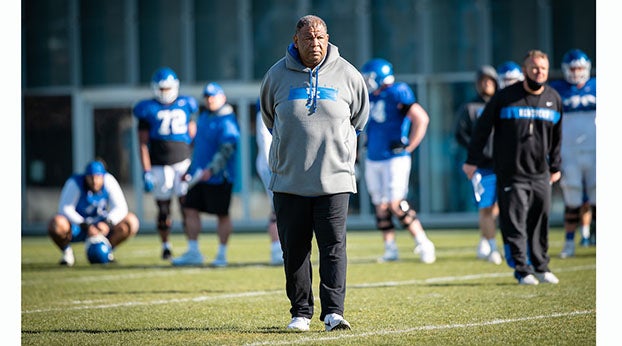A conversation with Silas House, Kentucky’s new poet laureate
Published 11:00 am Monday, May 8, 2023

- Silas House is inducted as Kentucky poet laureate at the annual Kentucky Writers Day celebration in the state Capitol rotunda in Frankfort. (Photo by Tom Eblen)
|
Getting your Trinity Audio player ready...
|
Kentucky Lantern
Growing up in Eastern Kentucky, author Silas House saw early the power of representation in literature.
Lead character John-Boy in the award-winning television series “The Waltons,” for example, was his “hero.”
Here was a young country boy who, like House, dreamed of writing.
“I didn’t know anybody who wanted to be a writer,” said House, who on April 24 became Kentucky’s new poet laureate. “I especially didn’t even know any boys who would admit to reading. So I was pretty lonely in the world as a reader, as a boy.”
In his new post, House feels “an extra layer of responsibility” to represent Kentuckians — and the full spectrum of the human experience, he said in a recent sweeping interview with the Kentucky Lantern.
People call him many things: Appalachian writer, working class writer, a writer of faith.
Now, he’s the state’s first openly gay poet laureate.
“I’m not offended by any of those labels,” the New York Times bestselling author said. “But … the way I think of myself is totally multifaceted.”
He strives to represent his characters that way, too.
“Any good writer is fascinated by human beings,” said House, whose awards include the 2023 Southern Book Prize and the Duggins Prize.
He started studying people in the long holiness church services he attended as a child.
“I was not allowed to take any toys with me, but I was allowed to take a notebook and pencil,” he said. “I remember studying people during those church services, and I would write … a little character sketch about everybody in the church … when you really look closely at people, it’s hard to see them as one dimensional.”
‘There is no monolithic gay person.’
House’s appointment as poet laureate – the first openly gay Kentuckian in the role – comes after a legislative session featuring several anti-LGBTQ bills.
Lawmakers banned gender-affirming care for transgender minors amid some bipartisan opposition.
Additionally, schools can now keep trans students from using the bathroom of their choice and teachers can misgender trans youth.
Drag shows also came under heat this session, which ended March 30.
“There are so many people that have felt … belittled and hurt by that legislation,” House said. “It feels like it’s legislation by a very vocal majority of the legislators that doesn’t really line up with the majority of Kentuckians, which, in a way, makes it even more frustrating.”
House, who’s spoken openly about having a transgender son, said the push for more parents’ rights this session didn’t include parents of LGBTQ+ children.
“No LGBT person I know is asking for special rights — they’re only asking to be treated equally. The same as parents of LGBT people should be treated like any other parents,” he said. “I think that’s one of the things that the legislation really has illuminated is that the parents of LGBT children are being given less rights than the parents of straight children.”
He’s focused on being “diplomatic” while representing all Kentuckians in his new role.
“I know that it’s important especially for young queer people to see me in the public,” he said. “I’m just happy to be out there as an openly gay person and to be visible and to show people that there is no monolithic gay person.”
Being gay also shouldn’t be politicized, House said.
“Somebody said to me the other day: ‘Why do you have to be so political about being gay?’” he said. “I’m not the one who politicized being gay. I’m just living my life.”
‘No agenda’ when writing.
Gov. Andy Beshear praised House’s work when introducing him as the new poet laureate.
“We are so proud of Silas, who grew up in Kentucky, was educated in Kentucky and now represents our state with such pride,” Beshear said. “Our commonwealth is fortunate to have him here teaching our future writers and now serving as our literary ambassador to the world.”
After Beshear — who is running for a second term — announced House’s appointment, the Republican Governors Association featured the writer in a 28-second attack ad calling him a “radical.”
Among those who jumped to House’s defense on Twitter was singer Jason Isbell, who tweeted, “Silas is my friend and he’s a wonderful person and y’all can just stay mad.”
“Anybody who knows me knows how much I love Kentucky,” House said in response to the ad. “I, especially as poet laureate, seek to represent as many Kentuckians as I can. I think that my many different identities allows me to represent a whole lot of Kentuckians because I’m not just one thing. Nor is anybody else.”
House wants people to think when they read his work, but said he doesn’t write with an agenda.
He seeks to challenge people’s way of thinking — just like literature did for him.
The reach of literature: Books can change a worldview
House’s latest book, “Lark Ascending,” is full of warning signs about what can happen when people buy into extremism.
“I know literature can get to people like that and can change people like that because it’s happened to me,” House said.
When he was a child, he said, he mostly believed whatever he learned in church. But when he was 14, he read the frequently banned book, “The Color Purple” by Alice Walker.
“I had been raised with this idea of God as this old white man in the sky with a big long white beard and he’s watching everything and he’s ready to throw a lightning bolt at anybody who disobeys,” House explained. “And suddenly she is showing me this idea of God that is loving and wants people to be happy and wants people to have pleasure. … Part of me was resisting this, because I’m like, ‘that’s not the God I was taught about.’ And the other part of me is like, ‘this is the God that makes so much more sense to me.’”
“The Color Purple” also exposed him to race and to people unlike him for the first time.
“I was only raised around white people,” he said. “It wasn’t an integrated place.”
Literature, he learned, can set in motion a thinking evolution and expanding point of view.
“That book totally changed my way of thinking,” he said. “It changed my worldview so that I evolved in my thinking afterwards.”
Coal and climate change: ‘We have to transition.’
In 2021 and 2022, House’s home region of Eastern Kentucky was hit with back-to-back deadly floods.
Though the region has survived many such catastrophes, science predicts flooding will become worse as Kentucky’s climate warms because of climate-warming emissions built up in the atmosphere.
House has often written about climate change, too, and advocated for protecting natural resources.
“I hear a lot of politicians talking about ‘we need a transitional economy,’” he told the Lantern. “That’s their job – is to make that happen. And one way that that could really happen is through … being a part of solar and wind power creation.”
Kentucky is missing an opportunity, he said, to lead when it comes to solving the climate crisis.
“The whole state is just a ripe opportunity for that to happen in a widespread way and we’re not taking advantage of it,” he added. “I think it’s easy to see why we’re not because it doesn’t behoove some politicians as much as other forms of energy do.”
House grew up in a coal and tobacco economy. His uncles, grandfather and brother-in-law worked in coal mines. His coal mining grandfather lost a leg in the mines, House said, and suffered from black lung, which is lung scarring from coal dust inhalation.
“I just keep hearing ‘coal’ dragged out,” House said. “It’s a proud heritage. We fueled the world. And I’m really proud to be the grandson of a coal miner. That’s a big part of my identity. … But we have to move beyond that. We have to transition.”
Lawmakers need to be “more progressive in their thinking about a just transitional economy for Kentucky,” House said.
He wishes climate change and natural resources discussions were not politicized.
“It just blows my mind that things like … keeping our water clean is politicized,” he said. “There’s this whole idea that if you say, if you acknowledge that climate change is real, then … you’ve … exposed yourself as too liberal or something. It boggles my mind that … we don’t do everything in our power to protect our water and our resources. It just speaks of what an instant gratification way of thinking we have.”
‘Poetry has really always sustained me.’
Kentucky’s poet laureate, whose job is to elevate the literary arts in the state, need not be a poet.
House is known for his novels but he has published poetry. And the genre “has really always sustained me,” House said, comparing the form to music and song.
“The first thing I do when I start working on a novel is: I gather the poetry that is going to speak thematically and tonally to the novel I’m working on,” House said.
To him, the best poetry is accessible verse and “can speak to you pretty easily.”
One of the poets he thinks does that well is Ada Limón, the United States poet laureate who makes a home in Lexington but is from Sonoma, California.
“A lot of people are turned off by poetry that makes them feel dumb,” House said. “And her poetry is easy to read even while it’s incredibly profound, thought provoking.”
Other notable writers of our time have called Kentucky home – bell hooks, Barbara Kingsolver, Wendell Berry and more.
House wants to use his tenure to bring more attention to Kentucky’s writing community — essentially marrying tourism with the literary tradition.
“The state is wonderful (at) historical markers, but there’s not a lot of them about our literature,” he said. “So I want to figure out ways to better acknowledge our literary history and our legacy and make that more visible for people who are visiting.”
He also wants to create a program that will teach Kentucky youth how to “take oral histories from their elders,” and produce them.
“I have … a two-year window where I can do a lot of things to help, especially young writers,” House said.
Already, House’s days are full. He teaches at Berea College and Spalding University’s Naslund-Mann Graduate School of Writing. He’s a freelancer and self-promoter on top of being a writer.
As a creative, though, it’s important that he finds stillness to avoid burnout.
He finds it by the creek in his yard or lying in the grass with his dog, Ari.





